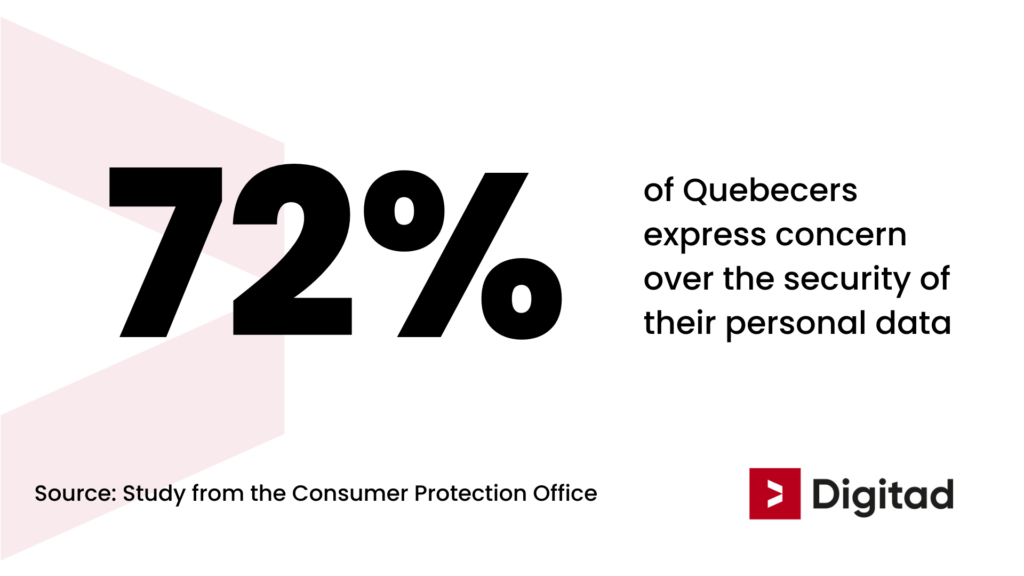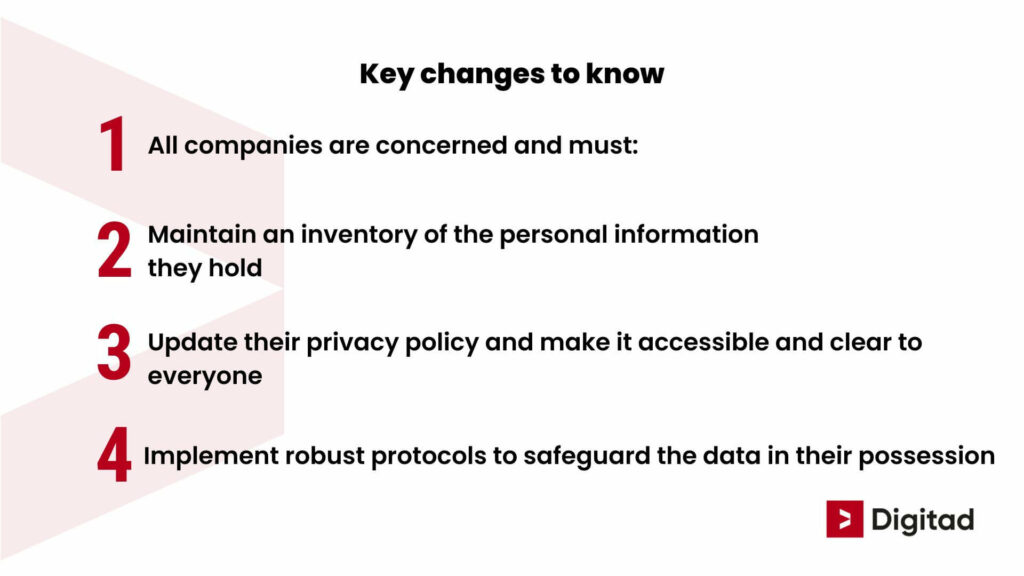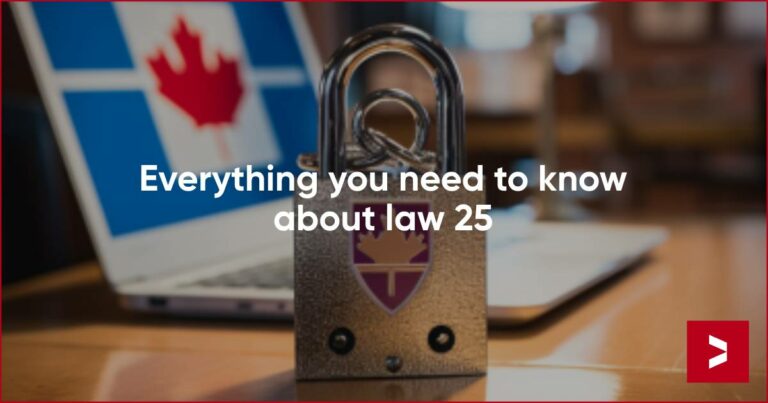Sommaire
72% of Quebecers are concerned about the protection of their personal data, according to a study by the Office of Consumer Protection.

The growing concern for data privacy in Quebec: why law 25 is a game-changer?
In response to this mounting concern, Quebec’s government introduced Law 25. While we may not have a 25th Stanley Cup, we do have Law 25. 🔥
What’s the Goal of law 25? The purpose of Law 25 is to enhance transparency, guarantee confidentiality, and empower individuals with more control over their personal data.
Our data analytics agency is here to offer you an in-depth look at Quebec’s Law 25. We’ll explore this crucial regulation from its origins to its impact on SMEs, facilitating your journey to easy compliance.
Ready to navigate the icy waters of data protection in Quebec with us?
What is Law 25 and why was it created?
The simple definition of law 25
Law 25 is all about privacy rights.
Think of Law 25 as the vigilant guardian of your digital secrets. It’s to your data what a vault is to your most valuable possessions.
Also known as the act respecting the protection of personal information, law 25 meticulously outlines how businesses and public organizations can collect, use, and share your personal information.
In a nutshell, it’s designed to ensure a person information doesn’t fall into the wrong hands or get misused, thereby boosting Quebecers’ trust in how their information is managed.
Impressive, right?

The enforcers: not CIA but CAI 🙃
The CAI, Commission d’Accès à l’Information du Québec is the designated authority overseeing the implementation of this law. It ensures businesses adhere to high standards of data protection by establishing a robust legal framework that promotes transparency, confidentiality, and data security respecting individual rights and consumer rights.
Don’t play with fire ⛔
And for those thinking of skirting the rules, be warned: the law includes penalties and criminal prosecutions for non-compliance.
What was the urgent need for this new legislation?
In our increasingly digital world, information travels at the speed of light. Imagine your personal secrets displayed on a giant screen in Times Square! Not comforting, is it?
That’s where Law 25 steps in.
It was crafted to address these growing concerns about personal information protection.
This new law 25 in Quebec mandates both public organizations and private companies to:
- Implement clear privacy policies
- Update their information inventory
Why SMEs shouldn’t ignore Law 25?
What are the major stakes for your business?
Small and medium enterprises need to pay close attention to Law 25 on personal information protection.
With the rise of Artificial Intelligence and the increasing digitization of data, privacy incidents involving personal information are becoming all too common. To dodge these pitfalls, SMEs must implement robust protective measures and align with the law’s requirements.
What counts as personal information?

Whether you’re a freelancer, a business, a cooperative, or even a non-profit organization, if you’re collecting or using personal information in your operations, Law 25 compliance is non-negotiable.
The cost of ignorance: severe penalties
Ignoring Law 25 can lead to significant legal and financial repercussions for SMEs. Companies that flout this law could face hefty fines, potentially reaching into the millions. Plus, privacy incidents can erode customer trust and inflict lasting damage on your brand reputation.
The financial penalties at stake
Here’s a breakdown of the fines you could be looking at for non-compliance:
| Offense Type | Individuals | Businesses and Public Organizations |
| Minor/Administrative | $500 – $50,000 | $1,000 – $10M or 2% of global revenue |
| Moderate | $1,500 – $50,000 | $4,000 – $10M or 2% of global revenue |
| Severe | $3,000 – $50,000 | $8,000 – $10M or 2% of global revenue |
| Very Severe | $5,000 – $50,000 | $15,000 – $10M or 2% of global revenue |
*The amount is based on the global revenue from the previous fiscal year if that amount is higher.

The role of the Quebec Access to Information Commission (CAI)
The key of Canadian privacy law
This authority is responsible for evaluating factors related to personal information protection, handling complaints, and ensuring individuals’ access rights are respected. They assess the types of offenses based on several criteria, including:
- The repetitive nature and duration of the offense
- The sensitivity of the information involved
- The number of people affected by the offense
- The risk of serious harm these individuals face
- The corrective measures taken by the offending individual or business
By understanding the stakes and aligning with Law 25, you’re not just complying—you’re fortifying your business against risks and building a brand that people can trust. So, let’s get you fully equipped to ace this high-stakes game.
Decoding law 25 obligations: your roadmap to compliance 💡
When to start complying to law 25?
Law 25 is being rolled out in phases over several years. Some provisions have been in effect since September 2022, while others will kick in by September 2024. This phased approach allows organizations to gradually adapt to the new requirements.
Key steps for Law 25 implementation:

As of September 22, 2022
- Designate a privacy officer: Every business must appoint a legal person responsible for personal information protection. Their contact details should be easily accessible, ideally on the company website
- Incident management/Breach notification: In case of a data breach, immediate steps must be taken to minimize risks and notify both the Commission and affected individuals. A record of such incidents should also be maintained
In reality, even though businesses show a willingness to comply, many face delays due to the law’s complexity.
Starting September 22, 2023 (pay attention here!⚠️ )

Governance policy: Businesses must establish a clear policy on personal information management and make it accessible on their website.
This document should be in plain language and include:
- Contact details for an internal point person
- Types of information collected and their intended use
- Data retention period and security measures
Risk Assessment: Before sharing personal information outside Quebec, a privacy impact assessment is required.
Consent and transparency: New rules on data collection consent are introduced.
- If you’re using Google Analytics or a Facebook pixel, you must inform website visitors that they’re consenting to share their information. Until they make a choice, don’t collect data
- If a user requests to withdraw consent, you must delete their personal information within 30 days
Data destruction: Once the data collection purpose is fulfilled, businesses must either destroy or anonymize the data.
Starting September 22, 2024
- Data portability: citizens can request access to their personal information and make corrections
Key changes you need to know about law 25
To sum it up, Law 25 introduces several pivotal changes that will significantly impact businesses of all sizes:
- Law 25 expands the scope of personal information protection to include both public organizations and private companies. This means all organizations must comply with legislative provisions concerning data collection, use, sharing, and destruction
- Businesses are required to maintain an inventory of personal information, assessing privacy-related factors
- Organizations must also update their privacy policies and ensure robust information governance
- In case of a privacy incident involving loss, unauthorized access, or disclosure of personal information, businesses must promptly report the incident to the Quebec Access to Information Commission (CAI) and implement preventive measures for the future

How to make your business law 25-compliant
A step-by-step guide 🛠️
Who should be in charge of compliance?
According to Law 25, every business must designate a person responsible for personal information protection. This individual should ensure that the company is in compliance with all legal and regulatory requirements concerning personal data protection.
Why It Matters? This person should have a deep understanding of the law and best practices in data protection. They should be capable of crafting and implementing policies and procedures to ensure data confidentiality.

Plus, Law 25 mandates that this individual’s title and contact details be publicly available, ideally on the company website, allowing direct communication in case of queries or concerns.
Nailing down consent
Under Law 25, valid consent for personal data collection must be clear, free, informed, and specific.
Organizations are required to inform individuals about the specific purposes for which their data will be collected, used, or shared.
How to do It? Start by listing all the types of personal information you might collect.

Then, create an easily accessible privacy policy that clearly outlines:
- The purposes of data collection
- Intended use of the information
- Security measures in place to protect the data
⚠️ Exceptions to Note: Explicit consent isn’t always necessary. For instance:
- When personal information is essential for contract execution (for example, delivery of a product or service)
- When data is used for research, studies, or statistics and is anonymized
- When data is shared with a legal team to defend an individual’s rights
Why a Privacy Impact Assessment (PIA) is crucial?
A Privacy Impact Assessment (PIA) is vital, especially for small and medium-sized enterprises (SMEs). This assessment identifies, evaluates, and manages potential privacy risks linked to a project or initiative. It ensures compliance with existing laws and regulations.
The PIA Advantage:
- Demonstrates your organization’s commitment to privacy
- Ensures the implementation of strategies to protect personal information
- Informs higher-ups about the PIA results, allowing them to endorse any remaining risks despite mitigation efforts
PIA guidelines:
- Preparation: Ask the right questions, define your business and project, establish role-sharing, know your data protection obligations, identify the personal information involved, and pinpoint interaction points.
- Analysis: Assess compliance with data protection obligations, identify and describe privacy risks, evaluate their impact.
- Report Writing: Detail the PIA process, identified risks, mitigation measures, and future recommendations.
In some cases, a PIA is mandatory for public organizations and private companies that automate personal information processing. However, even when not obligatory, it’s highly recommended for all businesses to conduct this assessment to ensure adequate data protection.
How to achieve optimal compliance with law 25? 🚀
Training Your team for advanced compliance
To nail compliance with Law 25 and the new legal obligations concerning personal data protection, it’s crucial to train your team effectively.
Here’s your roadmap:
- Craft a detailed yet straightforward presentation highlighting the shifts in data protection within your company ✅
- Pinpoint the roles and responsibilities of each staff member throughout the data lifecycle ✅
- Educate your team on the gravity of these changes, the core principles of Law 25, and the repercussions of non-compliance ✅
- Walk your team through the company’s policies and practices on data protection, ensuring they’re understood, implemented, and monitored ✅
- Spot any gaps in employee behavior and adjust your internal communication accordingly ✅
- Keep the team updated on legal changes and best practices. By investing in thorough, ongoing training, you’ll instill a robust culture of data protection within your organization ✅
Need help setting up this training and meeting legal requirements? Reach out to us for expert guidance!
Tech tips and tools to assist you
Companies can leverage various tech tools to meet Law 25 requirements and safeguard personal data. Here are some:
- Consent Management Platform
(CMP): Opting for a Consent Management Platform ensures effective data management from creation to deletion. Some top picks include
- OneTrust and TrustArc are Consent Management System: These tool helps collect, manage, and document individual consents for data usage, making it easier to revoke consent and enhance data transparency. Consent Manager is a go-to solution
- Secure portals: Platforms like Salesforce Customer 360 allow individuals to access their data, request corrections, or exercise their right to be forgotten
What happens with cookie management on your website?

We recommend:
- Assessing and categorizing all cookies you collect (essential, performance, customization, advertising)
- Installing a cookie banner to notify users about cookie collection, allowing them to accept cookies from desired categories. No data should be collected before this
- Logging user consents in a digital registry and setting a maximum retention period for any personal information. In short, think about your “right to be forgotten” policy. Provide means for users to request the deletion of their personal data, perhaps through a form on your website
One last pro tip?
Keep a keen eye on who holds what information, both internally and externally. Regularly review access permissions and ensure they’re legitimate. Revoke access from former employees or service providers. Using a password manager like LastPass can be a game-changer here!
Law 25 in a nutshell 🎯

Nailing Law 25 compliance isn’t a one-off task; it’s a full-on strategy. We’re talking cutting-edge tech tools, ongoing team training, and relentless vigilance. Why? Because it’s not just about dodging legal bullets. It’s about building a brand fortress that your customers and partners trust implicitly.
Feeling overwhelmed? Don’t sweat it, contact-us. Our specialized web marketing agency is here to guide you every step of the way.
If you want to see our achievements, it’s here!




